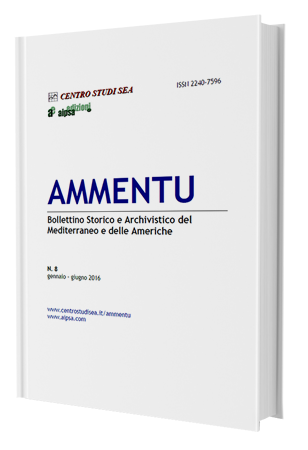An Antifascist in Tunisia: Velio Spano in Tunisi
DOI:
https://doi.org/10.19248/ammentu.217Keywords:
Tunisia, Italian community, Sardinian migration in Tunisia, Velio Spano, Tunisian Communist PartyAbstract
In the long and rich history of ongoing relations between Italian and Tunisian people, a period of particular interest is that between the mid-30s of the twentieth century and the end of World War II, when dozens of political opponents of the fascist regime found shelter in Tunisia and they organized there a fight network.The context in which they found themselves to live and work was the French protectorate. Tunisia was already shaken by strong anti-colonial and nationalist ferment (Habib Bourguiba in 1934 founded the Neo-Destour Party), and the role that Italians had in that period was not irrelevant, in the press (and the Left press in particular) in the political organizations and the local trade unions.
In this context, my essay will focus on the figure of Velio Spano, born in 1905 in Teulada, in Sardinia, clandestinely fled to France, where he entered in the foreign apparatus of PCI. Sentenced to six years' imprisonment by the Special Fascist Court, subsequently sent in Tunisia from the Communist party to organize the resistance. He has been living in Tunisi for five years, escaping two death sentences by the Nazis. In Tunisia, in 1939, he married Nadia Gallico (who, like him, will be a member of the Constituent Assembly in Italy in 1946).
The relationship between Italians and French who worked for the PCF and the PCI and the Tunisian nationalists was not always idyllic, but the contacts among the various sensibilities were very fruitful. This is attested by the fact that in 1941 Velio Spano reorganized the Tunisian Communist Party and became actually its main leader.
Downloads
Published
2016-10-11
Issue
Section
DOSSIER - Sardegna e Tunisia: una storia fra due sponde
License
Note on the copyright
The Copyright Notice below must be included with the journal information and in the metadata for each published article. Although every journal can freely determine the nature and scope of the copyright agreement with its authors, the Public Knowledge Project recommends the use of a Creative Commons license. For these purposes, an example is provided and may be copy and pasted in the space below for those journals that (a) offer open access, (b) offer deferred open access or (c) do not offer open access.









